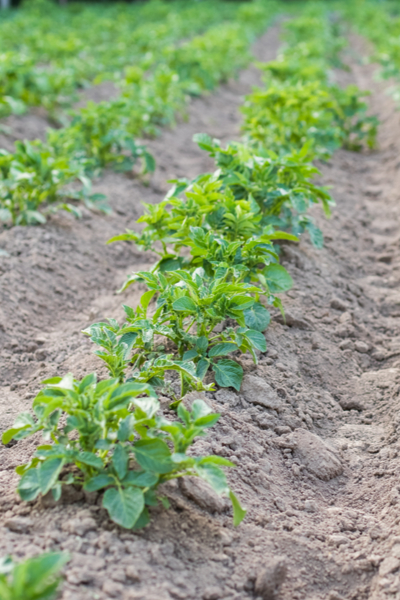Potato Planting:
Growing your own potatoes can be a rewarding and delicious experience. Whether you’re a seasoned gardener or new to the world of potatoes, knowing which plants to grow alongside your spuds can greatly benefit your potato harvest. In this article, we will explore the concept of potato companion plants and how they can enhance the growth and health of your potato plants. So, get ready to dig in and uncover the ultimate guide to potato companion plants!
Introducing Potato Companion Plants:
In the world of gardening, companion planting is a strategy that involves growing certain plants together, benefitting each other through mutually beneficial relationships. When it comes to potato plants, choosing the right companion plants can help reduce pests, improve soil fertility, and boost overall potato yields. By following these simple guidelines, you can create a thriving ecosystem in your garden, maximizing the potential of your potato crop.
Kellogg Garden and G&B Organics Soils:
When it comes to creating the optimal soil conditions for your potato plants, Kellogg Garden and G&B Organics soils have got you covered. As a reputable company providing organics, Kellogg Garden offers a range of high-quality soil products specifically designed to support healthy plant growth. By choosing their soils, you can ensure that your potato plants receive the nourishment they need to thrive. So, let’s dive into the world of potato companion plants and discover how to cultivate a successful potato garden!
Choosing the Right Potato Companion Plants
When it comes to planting potatoes, selecting the right companion plants can greatly benefit your potato crop. By choosing the right companions, you can not only improve the health and growth of your potato plants but also enhance the flavors and ward off pests naturally. In this section, we will explore some of the ideal potato companion plants that can be planted alongside your spuds to create a thriving and harmonious garden.
-
Marigolds: Marigolds are excellent companion plants for potatoes. Their vibrant yellow and orange flowers not only brighten up the garden but also act as natural repellents, deterring harmful pests such as nematodes and aphids. Additionally, marigolds attract beneficial insects like ladybugs and lacewings, which can help control potato pests.
-
Horseradish: Another great companion plant for potatoes is horseradish. This strong-flavored root vegetable helps deter Colorado potato beetles from attacking your potato plants. The pungent odor and taste of horseradish act as a natural repellent, protecting your potatoes from these destructive pests.

Beans: Beans and potatoes make great neighbors in the garden. Potatoes provide a natural trellis for beans to climb, which saves space and creates a mutually beneficial relationship. The beans fix nitrogen in the soil, benefiting the potato plants, while the potatoes provide shade for the bean plants, helping them thrive in hot summer months.
By selecting companion plants wisely, you can create a balanced and productive garden ecosystem that encourages the growth of healthy, vigorous potato plants. These are just a few examples of suitable potato companion plants, but the options are extensive. Experimenting with different combinations can lead to exciting discoveries and better yields in your potato harvest.
Tips for Successful Potato Planting
When it comes to potato planting, a few key tips can make all the difference in ensuring a successful harvest. Here are three important factors to consider for optimal potato growth:
-
Soil Preparation: Before planting your potatoes, it’s crucial to prepare the soil properly. Start by choosing a well-draining location with full sun exposure. Loosen the soil to a depth of at least 8 inches, removing any rocks or debris along the way. Incorporate organic matter, such as compost or aged manure, to improve soil fertility and structure. This will provide the ideal environment for robust potato plants.
-
Selecting the Right Companion Plants: Companion planting can play a significant role in enhancing potato growth while deterring pests and diseases. Some excellent potato companion plants include beans, corn, cabbage, and marigolds. These plants can help improve soil health, ward off harmful insects, and even provide shade or wind protection for your potato crop. By choosing the right companions, you can create a harmonious garden ecosystem that supports healthy potato growth.
-
Proper Watering and Fertilization: Potatoes require consistent moisture to thrive, but overwatering can lead to rotting tubers. It’s important to strike a balance by regularly checking the soil moisture levels. Water deeply when the soil feels dry a few inches below the surface, making sure not to saturate the roots. Additionally, consider fertilizing your potato plants with a balanced organic fertilizer, such as those offered by renowned companies like Kellogg Garden or G&B Organics. These specialized organic fertilizers can provide the necessary nutrients for strong and productive potato plants.
By following these tips, you can optimize your potato planting experience and increase your chances of a bountiful harvest. Remember to stay attentive to your potatoes’ needs throughout the growing season, addressing any potential issues promptly.
The Benefits of Using Kellogg Garden and G&B Organics Soils
Using Kellogg Garden and G&B Organics soils offers numerous advantages when it comes to potato companion planting. These high-quality organic soils provide the perfect foundation for healthy and thriving plants, resulting in better yields and overall garden success.
First and foremost, the use of Kellogg Garden and G&B Organics soils ensures that your potato plants receive the essential nutrients they need to grow and flourish. These soils are enriched with a balanced blend of natural ingredients, such as composted chicken manure and earthworm castings, which provide a rich source of nutrients for the plants. By incorporating these soils into your potato companion plant beds, you can rest assured that your plants will have access to the necessary elements for optimal growth.
In addition to their nutrient-rich composition, Kellogg Garden and G&B Organics soils also promote excellent soil structure and moisture retention. These soils are specially formulated to create a well-draining yet moisture-retentive environment, allowing the roots of your potato plants to access water and nutrients without becoming waterlogged. This balanced moisture level is crucial for preventing issues like root rot and ensuring healthy, vigorous plant growth.
Furthermore, by choosing Kellogg Garden and G&B Organics soils for your potato companion plants, you are making an environmentally friendly choice. These soils are carefully crafted using sustainable practices and organic materials, minimizing the use of synthetic fertilizers and pesticides that can be harmful to the ecosystem. By supporting these companies, you are actively contributing to a healthier and more sustainable gardening approach.
In conclusion, the benefits of using Kellogg Garden and G&B Organics soils for your potato companion plants cannot be overstated. From their nutrient-rich composition to their excellent soil structure and eco-friendly practices, these soils provide the ideal foundation for successful potato companion planting. Give your plants the best chance at thriving by incorporating these high-quality organic soils into your garden.









